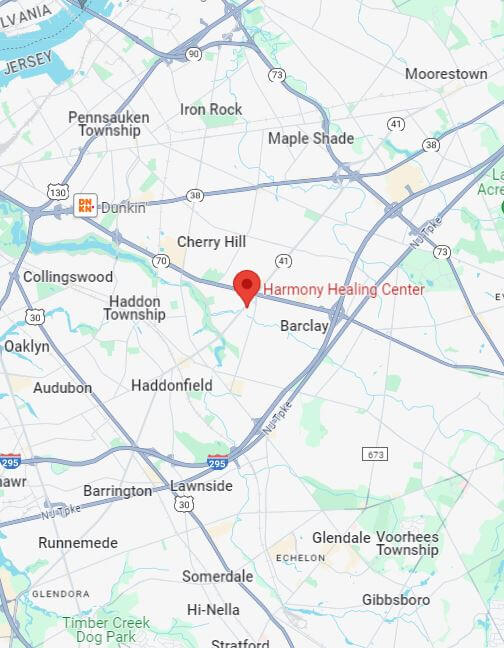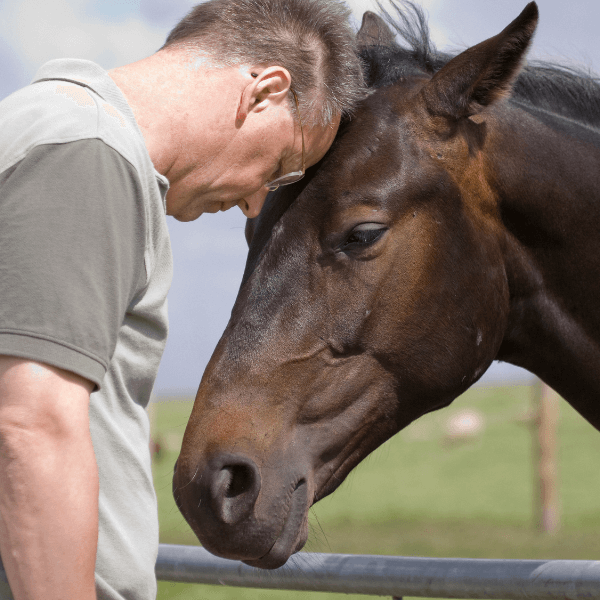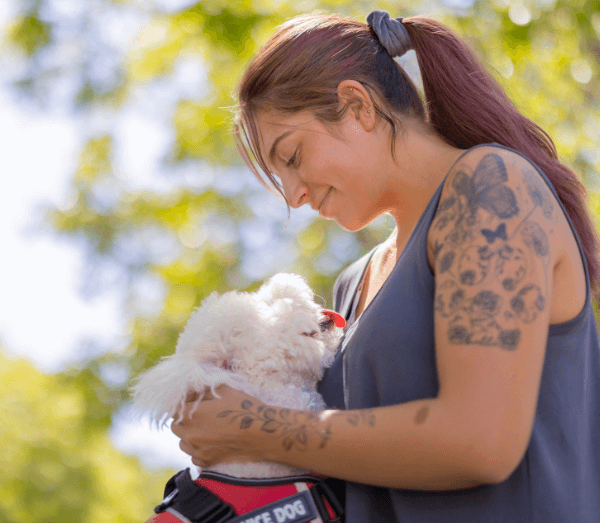Harmony Healing Center in Cherry Hill, New Jersey, is a rehab center that offers animal-assisted therapy in our drug and alcohol rehab and comprehensive rehabilitation services for those battling drug and alcohol addiction. Emphasizing holistic healing, our evidence-based therapies and personalized holistic-focused plans create a supportive and pet-friendly rehab environment for clients to reclaim their lives.
At Harmony Healing Center, we know that each person’s journey to recovery is unique. That’s why we take a personalized approach to treatment, tailoring our programs to meet our patient’s specific needs and preferences. For those who struggle with substance abuse and addiction, we offer specialized rehab programs designed to address their unique challenges and circumstances. With a focus on empowerment and healing, Harmony Healing Center is dedicated to helping you break the cycle of addiction and embark on a healthier future. If you or someone you love needs a animal-assisted therapy in a pet-friendly rehab, contact us at Harmony Healing Substance Addiction Treatment Center or call our caring staff at (888) 409-5653.
What Is Animal-Assisted and Pet Therapy?
Animal-assisted therapy (AAT) and pet therapy are therapeutic modalities that harness the healing power of animals to enhance physical, emotional, and social well-being. In animal therapy, trained animals, often dogs or cats but also including other animals like horses or rabbits, are incorporated into treatment sessions under the guidance of qualified healthcare professionals.
These emotional support animals play an active role in therapeutic interventions, engaging with patients to promote relaxation, reduce anxiety, and facilitate emotional expression. Conversely, pet therapy typically involves interactions with companion animals in hospitals, nursing homes, or rehabilitation centers. During pet therapy sessions, individuals are provided opportunities for affectionate contact with animals, which can evoke feelings of comfort, joy, and companionship, alleviating stress and enhancing overall mood.
What is animal-assisted therapy, and how does it help treat substance abuse? Both animal and pet therapy have yielded many benefits across various populations, including children, adolescents, adults, and the elderly. Research indicates that animal-assisted therapy in rehabilitation can contribute to improvements in mental health outcomes, such as better outcomes for depression and anxiety treatments, enhanced self-esteem, and increased socialization skills. Additionally, animal-assisted interventions and pet-assisted therapy have demonstrated efficacy in aiding physical rehabilitation efforts, facilitating motor skills development, and promoting relaxation and pain management. By fostering meaningful connections between humans and animals, therapeutic animals offer holistic and invaluable support for individuals striving to improve their quality of life.
Contact Us for a Free Assessment
Are you ready to turn the page and begin a new chapter in your story? We have the tools you need to transform your life. Let’s talk about what’s next.

What Is a Pet-Friendly Rehab Facility?
A pet-friendly rehab and addiction treatment facility is a rehabilitation center that accommodates individuals undergoing addiction recovery while allowing them to bring their pets along for treatment. Recognizing the profound animal-human bond, these facilities offer a unique approach to addiction recovery by allowing patients to maintain the companionship and support of their beloved pets throughout the rehabilitation process.
Pet-friendly rehab facilities strive to create a nurturing and comforting atmosphere that promotes healing and well-being by welcoming pets into the treatment environment. Patients are often encouraged to actively involve their companion animals in various aspects of their recovery journey, such as participating in therapy sessions, engaging in recreational activities, and receiving emotional support during challenging times. Research has shown that the presence of therapy dogs and other therapy animals can have therapeutic benefits, including reducing stress, anxiety, and isolation while fostering comfort, security, and connection. By embracing a pet-friendly approach, addiction treatment facilities address the individual’s recovery needs and recognize and honor the importance of the human-animal bond in promoting overall health and resilience. If you are looking for New Jersey animal-assisted therapy, contact Harmony Healing Substance Addiction Treatment Center at (888) 409-5356.
Do New Jersey Substance Abuse Rehab Centers Allow Pets?
New Jersey’s policy regarding pets in substance abuse rehabilitation centers varies. While some rehab centers may accommodate pets, others may not for various reasons, such as facility regulations, safety concerns, or specific treatment protocols.
Factors such as the type of treatment program, the severity of addiction, and the needs of the patient may influence whether pets are allowed during the rehabilitation process. Therefore, those seeking treatment for substance abuse in New Jersey should inquire directly with Harmony Healing Rehab Center to discuss their pet policy and whether accommodations can be made. If you or someone you know needs addiction rehabilitation and wish to include your pet in the treatment process, we encourage you to contact us at Harmon Healing. Our dedicated team at Harmony Healing Center is committed to providing tailored rehabilitation programs that address each person’s unique needs, including integrating animal-assisted therapy in a pet-friendly environment. Call us to learn more about our pet therapy options and how we can support your recovery.

Harmony Health Center – Cherry Hill, New Jersey
401 Kings Highway South
Building #1 Tara Corporate Park
Cherry Hill, NJ 08034
South Jersey Pet-Friendly Rehab for Drug and Alcohol Treatment
In South Jersey, Harmony Healing Center offers a compassionate and pet-friendly environment for individuals seeking drug and alcohol treatment. Conveniently located at 401 Kings Highway S, Cherry Hill, NJ 08034, our facility provides a range of treatment options to suit diverse needs.
From partial hospitalization programs (PHPs) with housing for immersive care to intensive outpatient programs (IOPs) for flexible scheduling, we cater to various levels of treatment intensity. Additionally, our facility offers medication-assisted treatment (MAT) for comprehensive support in managing substance use disorders, along with general outpatient services for ongoing addiction recovery and maintenance. At Harmony Healing Center, we are committed to providing comprehensive and personalized care in a supportive environment where people can start their journey to sobriety alongside their pets. To learn more about our treatment programs or rehab admissions process, call (888) 409-5356.
The Famous Towns, Cities, and Sites of the Garden State
How to Find Animal-Assisted Therapy in New Jersey
Finding animal-assisted therapy (AAT) in New Jersey can help individuals seeking addiction treatment find a rehab center that allows pets during the treatment process. Whether through participating in addiction rehabilitation centers, animal welfare groups, or professional associations, animal-assisted therapy rehab services are within reach.
Steps to Find Animal-Assisted Therapy
Finding animal-assisted therapy (AAT) in New Jersey can offer invaluable support and companionship for individuals seeking various forms of therapy, including addiction treatment. By exploring options through participating rehabilitation centers, animal welfare groups, or professional associations, individuals can discover AAT services tailored to their needs. With persistence, you can access animal-assisted therapy near you and start on the path to holistic well-being and addiction recovery. To begin the rehab admissions process and discuss animal-assisted therapy at our center, contact Harmony Healing Center in Cherry Hill, NJ, at (888) 409-5356.
Do Health Insurance Policies Cover Addiction Programs at Pet-Friendly Rehab Centers in New Jersey?
While many health insurance policies offer pet-friendly addiction treatment coverage, the extent of coverage and specific policies regarding pet-friendly facilities vary widely among insurers. Some insurance plans provide full or partial coverage for addiction treatment services at pet-friendly treatment centers, while others may not explicitly address this aspect of treatment.
It is essential for those seeking addiction treatment at pet-friendly facilities to carefully review their health insurance policies, including any exclusions or limitations related to coverage for such programs. Additionally, individuals considering addiction treatment at pet-friendly facilities in New Jersey should communicate directly with their insurance providers to clarify coverage details and inquire about any requirements or documentation needed to access benefits.
Additionally, the admissions team at Harmony Healing Center can provide valuable assistance in navigating insurance coverage and exploring alternative payment options if insurance coverage is limited. By proactively engaging with insurance providers and Harmony Healing, individuals can better understand their coverage options and make more informed decisions regarding their addiction treatment journey at pet-friendly facilities in New Jersey.
Will Health Insurance Pay for Animal-Assisted Therapy & Treatment?
Health insurance coverage for animal-assisted therapy treatment varies depending on the specific insurance policy and provider. Some plans may cover animal-assisted therapy treatment as part of their mental health or rehabilitation benefits, while others may not explicitly include this type of therapy.
At Harmony Healing Drug and Alcohol Addiction Treatment Center, we understand the importance of making sure our patients have access to the treatment they need. Our addiction treatment team works closely with patients to help them navigate their insurance coverage options for animal-therapy addiction treatment. Through personalized assistance and guidance, we support patients in contacting their insurance providers, insurance verification coverage details, and exploring potential financial assistance or payment options. By empowering patients to advocate for themselves and understand their insurance coverage, we strive to make animal-assisted therapy addiction treatment accessible and affordable for those in need.
Does Animal-Assisted Therapy Help With Recovery from Substance Abuse?
Animal-assisted therapy (AAT) has shown promise in aiding recovery from substance abuse by providing emotional support, reducing stress levels, and fostering connection during the rehabilitation process. Many studies focused on animal-assisted therapy have demonstrated the positive benefits of AAT on individuals undergoing substance abuse treatment, with outcomes including reduced anxiety, improved mood, and enhanced overall well-being.
Engaging with therapy animals can offer a unique form of companionship and comfort, encouraging individuals in recovery to develop healthier coping mechanisms and maintain motivation toward sobriety. In addition to emotional benefits, animal-assisted therapy can also address underlying psychological issues and promote social interaction among individuals recovering from substance abuse. By participating in activities such as caring for animals, individuals can develop a sense of responsibility, self-esteem, and empathy, which are crucial aspects of recovery. The presence of therapy animals can also create a supportive and non-judgmental environment that facilitates communication and trust between patients and healthcare providers. Call Harmony Healing Alcohol and Drug Addiction Treatment Center at (888) 409-5356 to discuss our treatment programs and animal-assisted therapy options.
What Animals Are Commonly Part of Therapy for Drug and Alcohol Addiction Treatment?
In drug and alcohol addiction treatment, animals can play a role in therapy sessions to support individuals on their journey to addiction recovery. Dogs are perhaps the most utilized therapy animals, known for their unwavering loyalty, companionship, and ability to provide emotional support.

Canine therapy, or dog therapy, involves interactions with trained therapy dogs, which can help reduce stress, anxiety, and feelings of isolation among patients in treatment. Similarly, cats are frequently incorporated into therapy sessions, offering comfort and companionship to individuals undergoing addiction treatment.
Equine therapy, involving interactions with horses, has also gained recognition for its therapeutic benefits in addiction treatment. Horse therapy allows patients to ride horseback, groom, and bond with these majestic animals, fostering trust, confidence, and emotional regulation. Additionally, aquatic animals such as fish and dolphins are utilized in therapy settings for their calming and soothing effects on individuals undergoing addiction treatment. Smaller animals like rabbits, hamsters, guinea pigs, and birds can also be included in therapy programs to provide gentle companionship and opportunities for nurturing interactions, contributing to the overall therapeutic environment of drug and alcohol addiction treatment facilities.
Pets Typically Allowed into Drug and Alcohol Treatment Centers
Pets are often welcomed into drug and alcohol treatment centers, providing comfort and support to individuals during their recovery journey. At Harmony Healing Center, we understand the profound bond between individuals and their pets, so we embrace a pet-friendly approach to treatment.
Whether you have a service animal, therapy animal, emotional support animal (ESA), small and non-allergenic pet, or even an outdoor pet, we encourage you to explore the options available at Harmony Healing. Our rehab team is dedicated to accommodating your treatment needs and ensuring a supportive environment where you and your beloved companion can embark on recovery together.
Service Animals
Therapy Animals
Emotional Support Animals (ESAs)
Small and Non-Allergenic Pets
Outdoor Pets

What Is the Cost of Animal-Assisted Therapy and Rehab Without Insurance?
The cost of animal-assisted therapy (AAT) and rehab without insurance varies depending on the treatment program, duration of stay, and additional services provided. On average, patients can expect to pay several thousand dollars per month for comprehensive addiction treatment that includes animal-assisted therapy services.
The total expense may encompass various components such as therapy sessions, medical care, accommodation, pet interactions, animal-assisted activities, and other amenities the rehabilitation center offers. Without insurance coverage, the financial burden of AAT and rehab can be significant, making it essential for individuals to consider alternative payment options and financial assistance programs.
At Harmony Healing Rehab Center, we understand the financial challenges individuals may face when seeking addiction treatment without insurance. That’s why Harmony Healing offers flexible payment plans and other financial assistance options to help patients offset the cost of animal-assisted addiction treatment. Our dedicated addiction treatment team works closely with patients to develop personalized payment arrangements tailored to their financial circumstances. By prioritizing affordability and accessibility, Harmony Healing Rehab Center strives to make AAT and rehab services accessible to all individuals seeking recovery from addiction. To learn more about the cost of animal-assisted therapy and rehab without insurance, contact us online or call us.
Related Therapy Programs at Harmony Healing for Mental Health and Substance Addiction
Stats and Information on Animal-Assisted Therapy and Rehab
Does animal-assisted therapy (AAT) work? AAT, also known as pet therapy, dates back to the 1960s, with notable figures like Sigmund Freud and Dr. Boris Levinson recognizing its therapeutic potential. Research indicates that therapy animals can help lower blood pressure and reduce anxiety in patients, with positive effects observed across various healthcare settings.
According to statistics from The Zebra and other reputable sources such as UCLA Health, the National Center for Biotechnology Information, and the Human-Animal Bond Research Institute, animal therapy statistics reveal compelling insights. For instance, animal interaction releases hormones like oxytocin and serotonin, contributing to relaxation and reduced blood pressure. Additionally, college students engaging in just 10 minutes of animal interaction experienced decreased levels of the stress hormone cortisol. With over 60% of US colleges offering pet therapy programs, the prevalence and effectiveness of animal-assisted interventions are increasingly recognized and embraced.
The Zebra also found:
- 74% of pet owners reported improved mental health after acquiring a pet.
- 75% of dog owners in the US include their canine companions in their outings and adventures.
- Research has demonstrated that dog ownership can decrease the risk of heart disease by 36%.
- 60% of hospice care providers offering alternative therapies incorporate pet therapy into their patient care plans.
- Interacting with animals releases beneficial hormones like oxytocin and serotonin, promoting relaxation and reducing blood pressure.
- Individuals undergoing total joint replacement required 50% less pain medication when engaging in canine therapy.
Additionally, in a multicenter national study published in August 2021 in Applied Nursing Research, researchers investigated the impact of animal-assisted activity on anxiety levels among older adults hospitalized in acute care settings. The study aimed to assess the potential benefits of incorporating animal-assisted interventions in healthcare settings to alleviate anxiety in this demographic. Through quantitative analysis, the research evaluated the effects of interacting with therapy animals on anxiety levels among hospitalized older adults, providing valuable insights into the role of animal-assisted activities as a complementary therapeutic approach in acute care settings.
Animal-assisted activity (AAA) demonstrated a notable reduction in anxiety levels among older adults experiencing mild anxiety during their inpatient hospitalization. This non-pharmacological approach emerges as a viable alternative intervention for addressing anxiety within this demographic.
Contact Harmony Healing Center
Get personalized help from an empathetic professional.
For Your Free Assessment Call:
